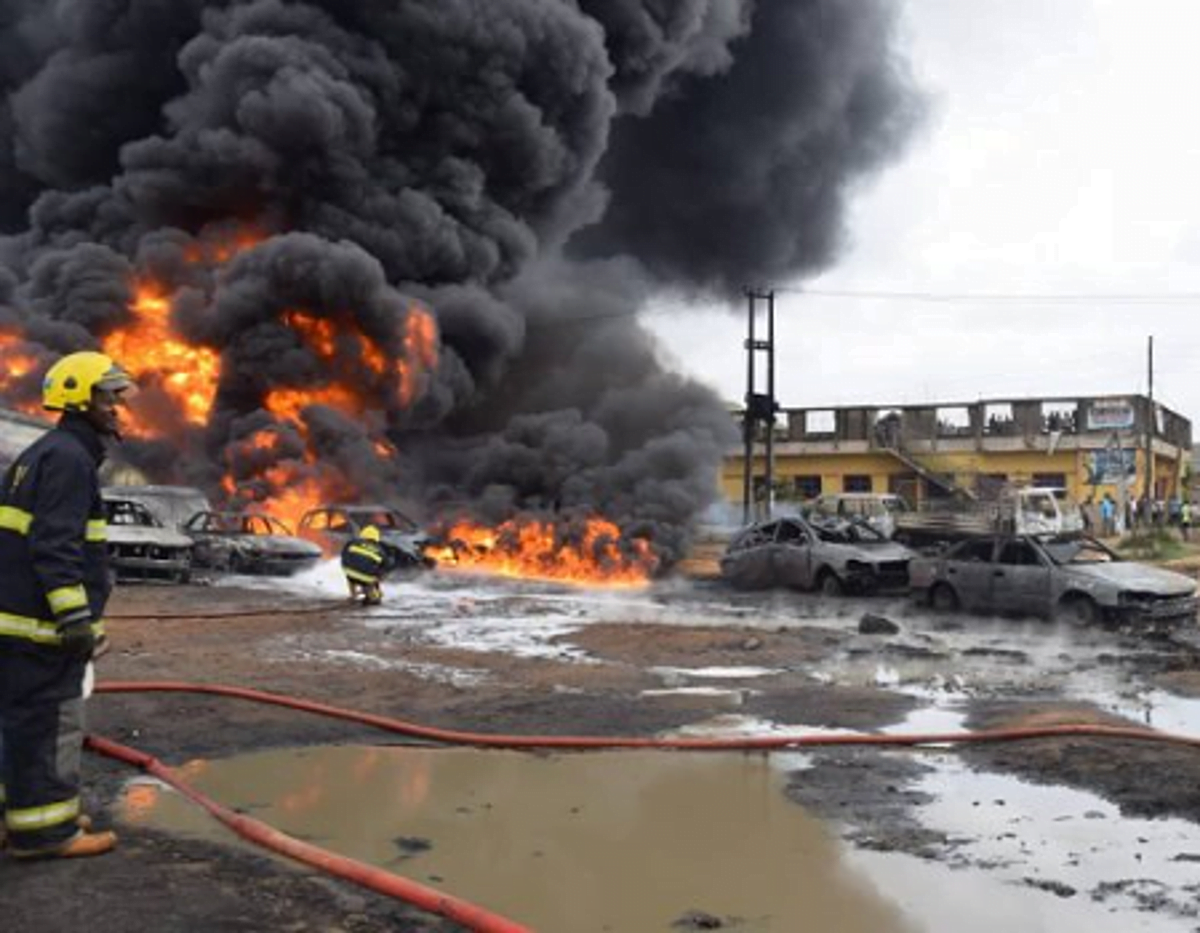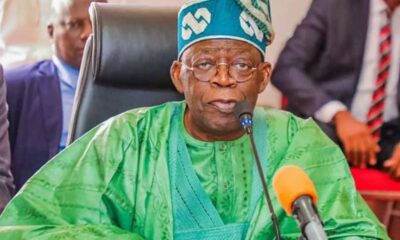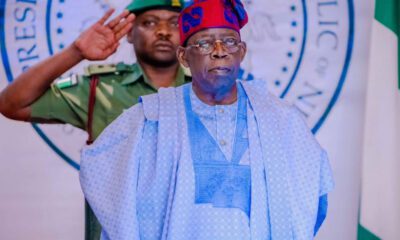Editorial
Tinubu’s Four Executive Orders and the continual rise in inflation
Despite the prompt step taken by President Bola Ahmed Tinubu to mitigate the economic downturn, inflation has continued to skyrocket.
The President last week set up a Committee headed by Fiscal Policy Partner and Africa Tax Leader at PwC, Taiwo Oyedele, to develop better tax reforms nationwide.
In a statement by Special Adviser on Special Duties, Communications and Strategy to the President, Dele Alake explicitly captured that the committee will comprise experts from both the private and public sectors and have responsibility for the various aspects of tax law reform, fiscal policy design and coordination, harmonisation of taxes, and revenue administration.
It recognises the importance of a sound fiscal policy environment and an effective taxation system for the functioning of the government and the economy.
“Nigeria ranks very low on the global ease of paying taxes while the country’s Tax to GDP ratio is one of the lowest in the world and well below the African average.
“This has led to an overreliance on borrowing to finance public spending which in turn limits the fiscal space as debt service costs consume a greater portion of government revenue, annually resulting in a vicious cycle of inadequate funding for socio-economic development.
“While some incremental progress has been recorded over the years, the outcomes have not been transformative enough to change the narrative,” he said.
It outlined the key challenges in Nigeria’s tax system to include multiple taxes and revenue collection agencies, fragmented and complex tax system, low tax morale, high prevalence of tax evasion, high cost of revenue administration, lack of coordination between fiscal and economic policies, and poor accountability in the utilisation of tax revenue.The establishment of this committee reflects President Tinubu’s commitment to addressing these challenges and bringing about transformative reforms in fiscal policy and taxation.
The committee’s primary objective is to enhance revenue collection efficiency, ensure transparent reporting, and promote the effective utilisation of tax and other revenues to boost citizens’ tax morale, foster a healthy tax culture, and drive voluntary compliance. These efforts will not only improve Nigeria’s revenue profile but also create a more conducive and internationally-competitive business environment.
“Our aim is to transform the tax system to support sustainable development and achieve a minimum of 18 per cent Tax to GDP ratio within the next 3 years without stifling investment or economic growth.
It should be noted that this committee will not only advise the government on necessary reforms, but will also drive the implementation of such recommendations in support of the comprehensive fiscal policy and tax reform agenda of the current administration.
Dwelling the four executives orders, the frst Executive Order was the Finance Act (Effective Date Variation) Order, 2023, which deferred the commencement date of the changes contained in the Act from May 23, 2023 to September 1, 2023 to ensure adherence to the 90 days minimum advance notice for tax changes as contained in the 2017 National Tax Policy; The second order, Alake stated, was the Customs, Excise Tariff (Variation) Amendment Order, 2023, which shifted the commencement date of the tax changes from March 27, 2023 to August 1, 2023, also in line with the National Tax Policy; Thirdly, Alake said the president gave an order suspending the five per cent Excise Tax on telecommunication services as well as Excise Duties escalation on locally manufactured products; Fourthly, the presidential adviser disclosed that the president ordered the suspension of the newly introduced Green Tax by way of Excise Tax on Single Use Plastics, including plastic containers and bottles. He added that the president also ordered the suspension of Import Tax Adjustment levy on certain vehicles.
During the The Nigerian Employers’ Consultative Association’s (NECA) summit yesterday, the Director General, Adewale-Smatt Oyerinde pinpointed the new Executive Orders signed by Tinubu have stopped many organised businesses in Nigeria from going into extinction.
He buttressed his argument on the Small and Medium Enterprises springing up gradually, noting that the Executive orders would allow the organised businesses to constructively dialogue with the government on some of the defects of the 2023 Finance Act. It did not stop the whole issue but temporarily stopped the business economy from sliding. It has allowed businesses to engage the government on new plans to get out of the inflation.
Beyond the executive orders by Mr. President, drastic measures must be considered constructively to address the impact of the fuel subsidy removal few weeks ago. A special account as suggested by many civil society organisations (CSOs) should be introduced so that the monthly N400 billion recovered or saved from the fuel subsidy removal should be tailored into infrastructural development.
Though, it is understandable that the organised labour unions and the federal government team are yet to come out with a lasting solution that will cushion the effect of the fuel subsidy removal, however, the government at the centre must focus on rapid infrastructural development nationwide especially providing effective electricity supply and roads network for businesses to strive.
The government in collaboration with stakeholders should encourage, fastrack the rise of modular refineries in addition to the Dangote Refinery because when more refineries spring up, there will be more products in circulation and fuel pump price will gradually reduce in accordance with laws of demands and supply in the market.
Another determining factor to curb inflation is that the federal and state government must be deliberate in the provision of palliatives, soft loans to the formal and the informal sector of the economy. Collateral requirements and interest rates on loans for the manufacturing sector should be drastically reduced to minimum.
The issue of salary increment for civil servants should be considered because if workers are well paid they will increase their standard of living which will lead to inflow of cash in the market for petty traders.
Ultimately, the Federal Government must look inwards by introducing policies and programmes that will enable state governors to harness the abundant mineral resources to contribute their quota to the development of the country. This will reduce the pressure on the funds coming from the Federation Allocation on monthly basis.
Editorial
Nigeria’s Human Rights conundrum: A call to urgent action


Nigeria’s human rights landscape has long been a cause for concern, but the latest revelation by the National Human Rights Commission (NHRC) paints a particularly dire picture.
The shocking disclosure that 1,580 human rights violations occurred in March 2024 alone is a stark reminder of the precarious state of human rights in our country.
Even more disturbing is the breakdown of these violations, which reveals a disproportionate impact on the North Central region and a troubling involvement of state actors, including the police, military, and DSS.
This crisis of accountability and protection demands urgent attention and action from all stakeholders, and it is our hope that this editorial will contribute to a much-needed national conversation on this critical issue
The most vulnerable members of our society, children, were not spared, with 542 cases of rights violations recorded. Domestic violence, which is becoming increasingly rampant, accounted for 471 cases.
Non-state and private actors were also responsible for 32 and 36 violations, respectively, while three cases of rights violations were recorded against people with disabilities.
The NHRC’s report is a wake-up call to all stakeholders, including the government, civil society organizations, and individuals, to take immediate action to address these violations.
The fact that social, economic, and cultural rights accounted for 157 violations, and referred cases stood at 24, highlights the need for a comprehensive approach to addressing human rights issues in Nigeria.
It exposed 499 killings and kidnappings, 71 violations of the right to life, and 301 school children abducted in Kaduna State alone.
The commission’s Senior Human Rights Adviser, Hilary Ogbonna, revealed these shocking statistics, which include 40 people killed in Benue State and four deaths in Nasarawa State during palliative distribution.
The report highlights a broader pattern of human rights violations, including domestic violence, abductions, and children’s rights abuses. It’s alarming that the right to life is being violated in various ways, and human rights violations are escalating.
This is despite Nigeria’s adoption of the Universal Declaration of Human Rights and over two decades of democratic governance.
The Global Peace Index Report’s ranking of Nigeria as one of the least peaceful countries in the world (144th out of 163) is a damning indictment.
The report emphasises the gravity of human rights abuses in Nigeria, where basic rights like freedom from oppression, participation in decision-making, and access to fundamental needs like food, work, medical care, and education are frequently denied.
However, the Universal Declaration of Human Rights, adopted in 1948, enshrines fundamental rights like freedom from oppression, participation, and access to basic needs.
While many countries, including Nigeria, have incorporated these rights into their constitutions, the reality on the ground is starkly different.
In Nigeria and Africa, people face physical and mental torture, police brutality, domestic violence, kidnappings, and detention without trial.
Since its declaration, it has become fashionable for most countries of the world, Nigeria inclusive, to entrench the catalogue of rights in their constitutions.
But, regrettably, in Nigeria, and indeed Africa, people are usually subjected to physical and mental torture ranging from cases of accidental discharge and other forms of police brutality, domestic violence, kidnappings as well as detention without trial.
Also, insecurity, in its various forms, has become a pervasive issue in Nigeria, manifesting as banditry, kidnapping, terrorism, and communal conflicts. This has resulted in the loss of lives and property, highlighting the government and security forces’ failure to fulfill their social contract with citizens. The lack of remedies for victims, including compensation and access to justice, has further worsened the situation.
The Nigerian Constitution guarantees the right to personal liberty, a fundamental feature of any democratic setting.
However, persistent obstacles, including legislative constraints, societal prejudices, and systemic shortcomings, hinder the full realization of human rights. It is crucial to acknowledge these challenges and work collectively to dismantle them.
The myriad of challenges facing Nigerians includes insecurity, separatist agitations, torture, illegal detention, extortion, and extra-judicial killings by law enforcement agencies.
Limited access to justice, abuse of court process, and disregard for court orders, as well as the increased cost of living and deteriorating living conditions, further hamper citizens’ ability to lead safe and meaningful lives.
Human rights protection plays a critical role in fostering vibrant democracies, promoting social cohesion and diversity, and cultivating a conducive and peaceful living environment.
To address these challenges, we recommend strengthening the independence of the judiciary, press freedom, democratic rules and principles, human rights education, and public vigilance. This will help curtail human rights abuses and promote good governance in Nigeria.
We urge the government, civil society organisations, and individuals to work together to address these pressing issues and ensure that the rights of all Nigerians are respected, protected, and fulfilled.
We also call on civil society organisations and individuals to continue to advocate for human rights and hold those in power accountable for their actions.
We also urge the government to take immediate action to address these violations, investigate and prosecute perpetrators, and implement policies to prevent future abuses. We also call on civil society organisations and individuals to continue advocating for human rights and holding those in power accountable.
The time for change is now. We must work together to ensure that the rights of all Nigerians are respected, protected, and fulfilled.
Editorial
Endless turnaround maintenance of Port Harcourt Refinery


Since 2021 when the turnaround maintenance of the Port Harcourt Refinery started, there have been heaps of failed promises of the production commencement date.
First, it was former Minister of State for Petroleum, Timipre Sylva promising severally of commencement of productions of Port Harcourt Refinery, but these promises never came to limelight till he resigned for political calling.
Next was the Managing Director of Port Harcourt Refinery, Ahmed Dikko who at a time said the turnaround maintenance was 98 percent completed and would have commenced operations in December 2023. That promise again was unfulfilled.
The Group Managing Director of Nigerian National Petroleum Company Limited (NNPC Ltd), Mele Kyari equally said that Port Harcourt Refinery would start production in two weeks time, that elapsed in April, 2024. April has come and gone.
The Head, Corporate Communications of NNPC Ltd, Olufemi Soneye was also quoted to have said that the reason for non-commencement of operations of the Port Harcourt Refinery was regulatory and compliance tests. As it seems, all efforts to restart the operations of the Port Harcourt Refinery and by extension other refineries, have been futile.
Political watchers have adduced poor management, corruption, sabotage and lack of political will as some of the problems confronting smooth operations of our refineries. They particularly accused those benefitting from importation of petroleum products as being responsible for the non-functionality of the four refineries in Nigeria.
Political will, of course, plays a major role in shaping directions the policies go. Political will in this instance translates to good leadership, and in this case, the buck stops at the table of the Federal Government, particularly the President, who doubles as the Minister of Petroleum.
Petroleum being the mainstay of the country’s economy should be given all the attention it deserves. The reason being that virtually everything in the country is tied to the petroleum products situation.
Since the announcement of the removal of fuel subsidy on May 29th, 2023 by President Tinubu on assumption of office, life has not been the same in Nigeria. Cost of living has risen astronomically, consequent upon the hike in price of petroleum products.
In the midst of plenty, courtesy of the abundant human and material resources, Nigeria is still often described as the poverty capital of the world. What an irony! Turnaround maintenance of the refineries subsists without end. Every hope is now placed on the Dangote Refinery, a private outfit. While the diesel price slash is commendable, how on earth will a single private entity take the whole country to Eldorado?
We cannot regulate what we do not produce, this is a natural principle that cannot be contravened. We only pray that Port Harcourt Refinery comes on stream someday.
We look forward to that time. Our position is that Government agencies saddled with the responsibility of providing fuel and other petroleum products to Nigeria must do their work and justify their pay.
This onerous task is mandatory and statutory to them and shall amount to disservice if they fail. Our prayer is not for them to fail, but that they fulfil their vows and make the country great for the overall interest of all.
Tecnimont, the Italian company undertaking the $1.5 billion rehabilitation project of the Port Harcourt Refinery has through its Local Managing Director, Gian Fabio Del Cioppo pledged to fulfil the terms of contract, so as far as we are concerned, there is nothing stopping the country from achieving the target of the turnaround maintenance project.
The only clog would of course be lack of political will, which we know could be cultivated. So let all hands be put on deck to achieve results.
Editorial
Gas explosions: Nigeria and its avoidable tragedies


Nigerians die daily for reasons so avoidable it would make a 19th century peasant weep. The deaths are often a product of systemic wickedness, nonchalance, and greed. Too often have gas explosions claimed the lives of Nigerians untimely. Whether it is the leaders refusing to enforce the checks and balances for personal gain, or citizens selling defective gas cylinders, it all balls down to a collective aversion for kindness.
The internet is rife with news of this tragedy occurring in a Sisyphean cycle. Jolted by the cries of the populace, the leaders promise reprieve, release press statements and in the weeks that follow, little to nothing happens. “One must imagine Sisyphus happy,” Camus wrote. Unfortunately, our Nigerian dead imagine nothing.
While people relaxed from their labour, were preparing for the Workers Day celebrations, nine people including a pregnant woman were injured in Tuesday’s gas cylinder explosion at Alaba Lane, Alayabiagba Community of Ajegunle-Apapa, Lagos.
“The fire explosion started around 1:30 pm and immediately, two tricycles were burnt, school children coming back from school were affected. A particular young man was seriously affected as his body was peeling off, but rushed to the Gbagada General Hospital,” according to reports.
The usual suspect is, of course, negligence, as the Director of Lagos State Fire and Rescue Service, Margaret Adeseye, puts it: “preliminary investigation revealed that several various gas cylinders traded within the neighbourhood have one triggered from a susceptible leakage leading to the snapping of a high tension cable and resultant Fire.”
The explosion razed down “four commercial tricycles, six lock-up shops, a bungalow part of properties, while salvaging adjoining structures including a major fuel service station.” Children were hurt, the future of the nation plunged, as usual into avoidable misfortune.
The way out is through. The press releases are wonderful PR statements but they do not bring back the dead, as was the case in Ogun State recently where a truck explosion cost the nation another life. The leaders must enforce the checks and balances put in place. The law is no decoration.
We mustn’t wait until a politician’s family member is involved in a tragic gas accident before “banning” (as is the default response of the Nigerian leadership). The leaders must realise that such misfortunes are contagious, and money is hardly a bulwark against 3rd degree burns in a nation where all its doctors are fleeing.
Renewed Hope requires renewed action. This is all that Nigerians ask of its leaders. All agencies responsible for monitoring trucks, cylinders need to work together to defeat this peculiar evil. Like COVID-19, gas explosions are no respecter of persons.
Of course, citizens too must do their part and resist the allure of profit over the death of others. A society without empathy is headed for a dystopia. It will not matter the price of petrol or electricity tariff, if all that matters is the pursuit of super profit at the expense of one’s neighbour. We owe it to the dead to live fully and graciously. To escape, as we should, avoidable tragedies.
-
capital market2 years ago
Rt.briscoe, FBNH, Others halts negative performance of stock market
-
Finance3 months ago
Court orders Sen. Victor Umeh to repay N136m bank debt to AMCON
-



 Abuja Update2 months ago
Abuja Update2 months agoUNDP, FG partnership needed to achieve inclusion, equity- Minister
-
Abuja Update1 month ago
Banks drive stock market performance with N147bn gain
-



 Business2 weeks ago
Business2 weeks agoTingo Group unveils Tingo Electric, Tingo Cola drink at Lagos launch
-



 Health3 weeks ago
Health3 weeks agoCapacity training will reduce migration of health workers- NPHCDA
-
News4 months ago
Oil thieves sponsoring malicious media campaign against Navy – Spokesman
-



 Infotech1 month ago
Infotech1 month agoWorld Backup Day: NITDA urges Nigerians to ensure backup of data












